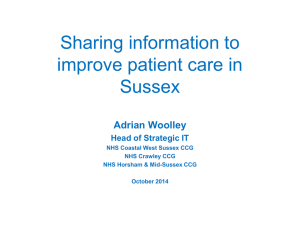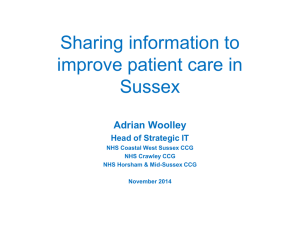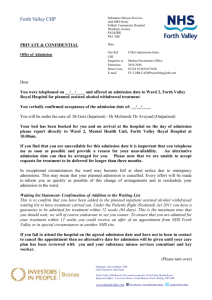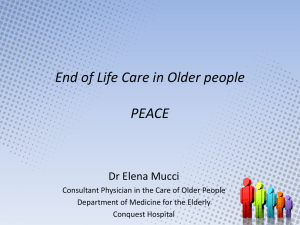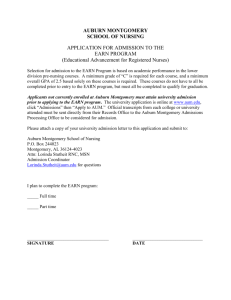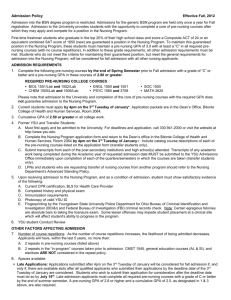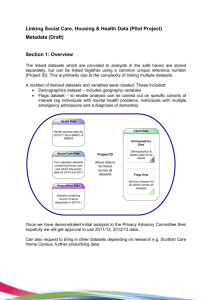Adrian Woolley Birmingham
advertisement
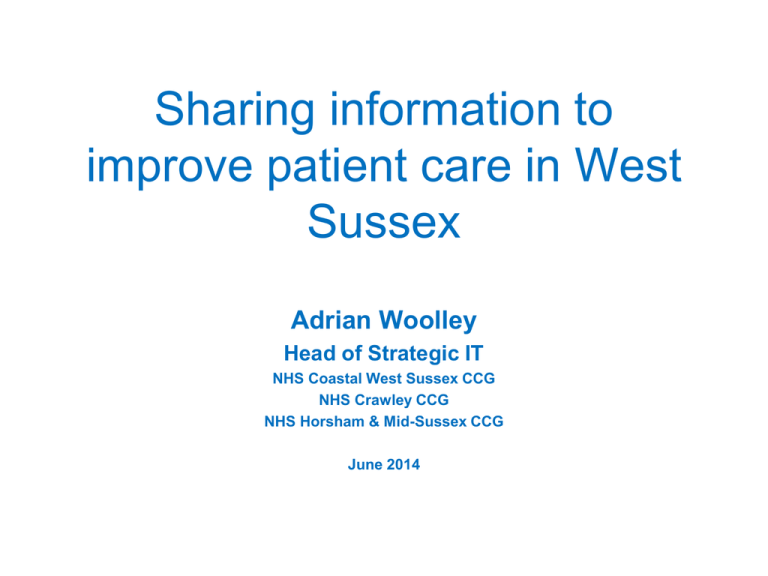
Sharing information to improve patient care in West Sussex Adrian Woolley Head of Strategic IT NHS Coastal West Sussex CCG NHS Crawley CCG NHS Horsham & Mid-Sussex CCG June 2014 Sharing information to improve communication & inform patient care Photo: sparkle glowplug The 15 million people in England with long term conditions… their treatment and care absorbs 70% of acute and primary care budgets in England. The issue…failure to provide integrated care Fragmented care: the healthcare system…not being considered in a whole system approach with social care… Lack of informational continuity: care records which can’t be accessed between settings... Reactive services, not predictive services: failure to identify vulnerable people who might then be given extra help to avoid hospital admission or deterioration / complications of their condition… LTCs Admission Avoidance Proactive care planning Joint working between health and social care End of Life care Care providers can have ‘silos’ of information held within their organisational boundaries GP practice system Hospitals Community Nursing Significant diagnosis DNACPR Admission Avoidance DES Care Plan ECG Diabetes clinic In-patient discharge letter Specialist nurse record Contingency Care Plan Mental Health Dementia nursing MH Crisis Plan Social Services Social Services visit daily Care providers can have ‘silos’ of information held within their organisational boundaries GP practice system Hospitals Community Nursing Significant diagnosis DNACPR Admission Avoidance DES Care Plan ECG Diabetes clinic In-patient discharge letter Specialist nurse record Contingency Care Plan Mental Health Dementia nursing MH Crisis Plan Social Services Social Services visit daily A real time Read Only viewer for use in direct patient Care, with Information derived from both Health and Social Care ROCI Challenges for this type of project •The classics – stakeholder engagement etc x n2. •Information Governance, legal opinion •Data access. Paternalism •Commercial self interest of system suppliers •Finding care plans •Waiting for Spine 2 A Virtual IDCR Live data (no data warehouse) Live data (no overnight updates) Consent to view at point of need Real time messaging to multiple systems – ‘send pertinent information for unscheduled care’ GP NHS No, Name, DoB Hospital Community Nursing Integration Engine and VIPER360 portal Mental Health RBAC Social Services Consent record for audit What data could be available? From GP (via MIG): a patient summary problems diagnoses medication (current, past and issues) risk and warnings procedures investigations blood pressure measurements encounters, admissions and referrals patient demographics From SCR: current meds allergies adverse reactions From Community Trust open referrals From Social Services: Main Address Current Address Placement Address Allocated Worker, Open/Closed Agency Providing Care Package Funded? Emergency Next of Kin details Does the Subject Have a Carer? Is the Subject a Carer? From Acute Trusts: recent admissions & discharges EDD From care plan repository: anticipatory care plans LC One place to find care plans = reduced conveyance by ambulance. A&E (ROCI) Ambulance OOH GPs Data readers Sussex wide care plan database GP Admission Avoidance DES care plans Proactive Care Data sources EoLC Plans Live data from the GP clinical system Patient details Examinations Events Summary Investigations Problems Procedures Risks & warnings Potentially useful in admission avoidance Recent tests Biochemistry ECG Haematology Imaging Microbiology Cytology Others Physiology Urinalysis So where have we got to? • PIA and Information Sharing Agreement signed by relevant parties • Trust Interface Engine (messaging technology) installed and operational. • Several practices signed up to supplying data (MIG). • Pull of MIG data through system tested and working. • Social Services record to include NHS numbers Next steps • Turn on integration to Social Services data • Turn on integration to Care Plan repository • Clinical safety sign off • Pilot go-live at A&E Potential other applications of the technology •Discharge planning / Alerting •Hospital in-reach •Planned Care Thank you adrian.woolley@nhs.net Photo: garryknight
